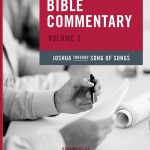Toward the end of Thursday night’s Republican presidential primary debate, moderator Megyn Kelly asked the candidates this question from a Facebook user: “I want to know if any of them have received a word from God on what they should do and take care of first.”
The phrase “a word from God” in the context of a political debate may have been a little startling at first. However, the assumption underlying the question—that God can and does call people to be involved in politics and government, as well as provide political leaders with direction—should not startle us.
The story of creation, fall and redemption includes all of human activity, including government. We see examples of God at work through social structures and political appointments—even giving close instruction to governing authorities—throughout the Bible.
On place we see this is in the book of Numbers. The book is called “Numbers” in English because it records a series of censuses that Moses took of the tribes of Israel. –The Israelites had departed Egypt as a barely organized refugee mob (Exod. 12:34-39) who now had to be organized into a functioning nation. –Censuses were taken to quantify the human and natural resources available for the economic and governmental affairs, including military service (Num. 1:2-3; 26:2-4), religious duties (Num. 4:2-3, 22-23), taxation (Num. 3:40-48), and agriculture (Num. 26:53-54). God himself ordered the censuses (Num. 1:1-2).
God directs Moses to enumerate the population (the first census, Num. 1:1-3) and create a provisional government headed by tribal leaders (Num. 1:4-16). Under God’s further direction, Moses appoints a religious order, the Levites, and equips them with resources to build the tabernacle of the covenant (Num. 1:48-54). He lays out camp housing for all the people, then regiments the men of fighting age into military echelons, and appoints commanders and officers (Num. 2:1-9). He creates a bureaucracy, delegates authority to qualified leaders, and institutes a civil judiciary and court of appeal (this is told in Exodus 18:1-27, rather than in Numbers).
Later, in Numbers 35:1-5, God gives detailed instructions to Moses about civic planning for sustainable economic development.
Moses’ activities of organization, leadership, governance, and resource development are closely paralleled in virtually every sector of society today—business, government, military, education, religion, nonprofits, neighborhood associations, even families. In this sense, Moses is the godfather of all managers, accountants, statisticians, economists, military officers, governors, judges, police, headmasters, community organizers, and myriad others.
Of course, we cannot take and directly apply the regulations in Numbers today. Conditions today require different specific solutions. However, we can acknowledge that wise, just, and fairly enforced laws respecting property and economic structures, individual rights, and the common good are essential in every society.
The detailed attention Numbers gives to organizing workers, training leaders, creating civic institutions, developing logistical capabilities, structuring defenses, and developing accounting systems suggests that God still guides and empowers the ordering, governing, resourcing, and maintaining of social structures today.
Those who are called to be involved in government and politics can seek and expect God’s guidance.
Click to Follow Theology of Work Project on Facebook

This article contains excerpts from the Theology of Work Bible Commentary, available for free in its entirety online. From Genesis through Revelation, the commentary explores what the Bible says about everyday work.
Read more from the commentary:
- Introduction to Numbers
- God Numbers and Orders the Nation of Israel (Numbers 1:1-2:34)
- Land Ownership and Property Rights (Numbers 26-27; 36:1-2)
- Civic Planning for Levitical Towns (Numbers 35: 1-5)












